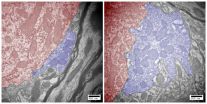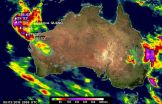(Press-News.org) BUFFALO, N.Y. -- Cells that relay information from the ear to the brain can change in significant ways in response to the noise level in the environment.
That's one major finding of a study out today in the Early Edition of the Proceedings of the National Academy of Sciences.
Expose the cells to loud sounds for a prolonged period of time, and they alter their behavior and even their structure in a manner that may aid hearing in the midst of noise. End the ruckus, and the cells change again to accommodate for quieter environs.
"The brain is amazingly adaptable: The way it receives information can change to accommodate for different conditions, and this is what we see in our research," said Matthew Xu-Friedman, PhD, an associate professor of biological sciences at the University at Buffalo. "What we see is that the cells in the auditory nerve adjust. They change themselves so they can respond to a different, heightened level of activity."
The research, conducted on mice, was led by Xu-Friedman and completed by a team at UB and the Johns Hopkins University School of Medicine. The study tested how the animals responded to living in a noisy habitat for a week, and how the noise-exposed animals then reacted to a quiet environment.
Auditory nerve cells as frugal savers
When the ear is exposed to a noise, cells in the auditory nerve release chemicals called neurotransmitters. These chemicals tell the brain that the ear has been stimulated. That's how we hear.
One problem that can complicate this process is depletion of neurotransmitter: Each cell has a limited supply of the chemicals, and when a cell runs out, it loses its ability to contact the brain. This becomes an issue in noisy environments, where constant stimulation puts cells at risk for using up neurotransmitter too fast.
Xu-Friedman believes that the adaptations that mice exhibited in the new study are geared toward addressing this complication.
For a week, the animals were exposed to noise akin to that made by a lawn mower or hair dryer.
In response to this provocation, the animals' auditory nerve cells became more frugal, discharging a smaller proportion of their neurotransmitter reserves in response to stimuli than comparable cells in animals reared in quieter habitats. This meant the noise-exposed mice would be less likely to deplete neurotransmitters while processing background noise, and more likely to have chemicals available for signaling the brain when new sounds appeared.
"The changes could help the animals deal with loud conditions and not go deaf," Xu-Friedman said. "Instead of draining your limited supply, you save some of it so you can continue processing new stimuli."
In addition to altering their behavior, the animals' auditory nerve cells also changed their structure, enlarging their synaptic endings. This is the region of the cells where neurotransmitters are stored, and the increase in size implies that the cells were upping their inventories of the chemicals, Xu-Friedman said.
Reverting to normal behavior
When the researchers placed the noise-exposed mice into a quiet habitat, the animals' auditory nerve cells adapted, once again, to new conditions.
The cells released neurotransmitters at a level akin to mice that had never been in loud environs.
These results demonstrate the brain's adaptability, said Xu-Friedman.
"We think we may have found another form of homeostasis," he said. "If the brain needs to process information under many different conditions, it's helpful if there's a set of rules to follow, ways to behave when activity is high and when activity is low. That appears to be happening with regard to these cells in the auditory nerve."
INFORMATION:
The study was funded by grants from the National Institutes of Health, National Science Foundation and Dalai Lama Trust Fund.
Xu-Friedman's co-authors on the paper were Tenzin Ngodup and Jack A. Goetz in the Department of Biological Sciences at UB; Brian C. McGuire and Amanda M. Lauer in the Center for Hearing and Balance and Department of Otolaryngology-Head and Neck Surgery at Johns Hopkins University School of Medicine; and Wei Sun in the Center for Hearing and Deafness and Department of Communicative Disorders and Sciences at UB.
A multidisciplinary team of Johns Hopkins researchers has developed two new strategies to treat depression in young people using the selective serotonin reuptake inhibitor (SSRI) class of medications. These strategies, published May 5 in the journal Translational Psychiatry, incorporate a new understanding of how to mitigate the risk of suicide while on SSRI treatment.
"These medications have to be dosed in a careful way," says senior investigator Adam Kaplin, M.D., Ph.D., an assistant professor of psychiatry and neurology at the Johns Hopkins University School of Medicine. ...
(Winston-Salem, N.C. - May 5, 2015) - Researchers from Wake Forest University and the University of Utah are the first to successfully fabricate halide organic-inorganic hybrid perovskite field-effect transistors and measure their electrical characteristics at room temperature.
"We designed the structure of these field-effect transistors that allowed us to achieve electrostatic gating of these materials and determine directly their electrical properties," said lead author, Oana Jurchescu, an assistant professor of physics at Wake Forest. "Then we fabricated these transistors ...
HOUSTON -- ( May 5, 2015 ) -- The effectiveness of cancer vaccines could be dramatically boosted by first loading the cancer antigens into silicon microparticles, report scientists from Houston Methodist and two other institutions in an upcoming Cell Reports (early online).
Model studies showed that microparticles loaded with an antigen, HER2, not only protected the antigen from premature destruction, but also stimulated the immune system to recognize and relentlessly attack cancer cells overexpressing the HER2 antigen.
"We could completely inhibit tumor growth after ...
An intervention to connect low-income uninsured and Medicaid patients to a reliable source of primary health care shows promise for reducing avoidable use of hospital emergency departments in Maryland. A University of Maryland School of Public Health study evaluating the results of the intervention was published this week in the May issue of the journal Health Affairs.
For twenty years, use of hospital emergency departments has been on the rise in the United States, particularly among low-income patients who face barriers to accessing health care outside of hospitals ...
The rainfall accumulation analysis above was computed from data generated by the Integrated Multi-satellite Retrievals for GPM (IMERG) during the period from April 28 to May 3, 2015. During this period IMERG algorithms continuously merged and interpolated satellite passive microwave precipitation estimates and microwave-calibrated infrared (IR) satellite estimates over the entire globe.
Rainfall from cyclone Quang fell over the west coast and a non-tropical system pounded the east coast of Australia simultaneously during the past weekend. Cyclone Quang formed in the South ...
A pilot study has found that participating in a nine-week training program including elicitation of the relaxation response had a significant impact on clinical symptoms of the gastrointestinal disorders irritable bowel syndrome and inflammatory bowel disease and on the expression of genes related to inflammation and the body's response to stress. The report from investigators at the Benson-Henry Institute at Massachusetts General Hospital (MGH) and at Beth Israel Deaconess Medical Center (BIDMC), published in the open-access journal PLOS ONE, is the first to study the ...
Out loud, someone says, "The man is catching a fish." The same person then takes pen to paper and writes, "The men is catches a fish."
Although the human ability to write evolved from our ability to speak, writing and talking are now such independent systems in the brain that someone who can't write a grammatically correct sentence may be able say it aloud flawlessly, discovered a team led by Johns Hopkins University cognitive scientist Brenda Rapp.
In a paper published this week in the journal Psychological Science, Rapp's team found it's possible to damage the speaking ...
Environmental factors similar to those affecting the present day Great Barrier Reef have been linked to a major slowdown in its growth eight thousand years ago, research led by the University of Sydney, Australia shows.
"Poor water quality, increased sediments and nutrients - conditions increasingly being faced by the modern day reef - caused a delay in the Reef's growth of between seven hundred and two thousand years duration," said Belinda Dechnik, from the University of Sydney's School of Geosciences and lead author of an article published in Marine Geology in May. ...
Why does a species not adapt to an ever-wider range of conditions, gradually expanding its geographical range? In their paper published on May 5 in PNAS (Proceedings of the National Academy of Sciences), Jitka Polechova and Nick Barton at the Institute of Science and Technology Austria (IST Austria) seek to answer this question, which lies at the interface between ecology and evolution. The theory presented by Polechova and Barton suggests that any natural population is liable to form sharp margins.
J.B.S. Haldane, one of the founders of population genetics, studied ...
In cooperation with a Swiss research team, geographers of Ludwig-Maximilians-Universitaet (LMU) in Munich have developed a novel measuring system relying on two different physical methods that promises to enhance forecasting of avalanches and spring floods. The method combines GPS and radar to measure snow properties also on the slopes.
Accurate forecasting of avalanches, and the risk of flooding in Alpine catchment areas during the spring thaw, primarily requires time-resolved data on snow volumes and the levels of liquid water in the snow cover. A research group led ...


